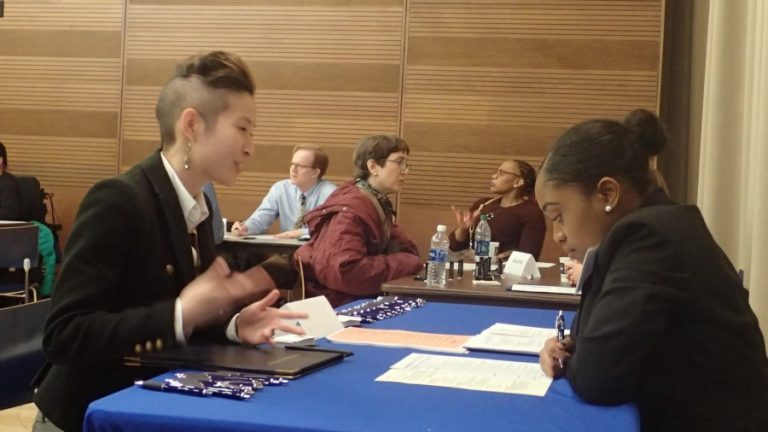On Wednesday, March 21st, PYD youth and staff participated in Lights! Camera! Access! 2.0 Boston, a Disability & Media Summit featuring expert panelists and professionals from Google, BBDO, National Disability Mentoring Coalition, PolicyWorks and Futuro Media Group as well as others in the entertainment and media industries to help mentor, motivate, EMPOWER, and network with aspiring professional college students, recent graduates, and career transitioning youth with disabilities.
According to the 2016 Ruderman Foundation White Paper, “95% of television characters with disabilities are portrayed by non-disabled actors. Under-representation of people with disabilities exists in ALL forms of traditional media, broadcast and entertainment, as well as emerging digital platforms in front of and behind the scenes. This stark under-representation contributes to a severe lack of professional media role models for youth with disabilities and perpetuates the myth of “invisibility” of people with disabilities.”
Because of the snow storm the panel and workshop portions of the summit were converted to a virtual webinar, and the employer and flash mentoring one-on-one sessions will be rescheduled at northeastern university later this year.
“The meeting was very good – learned a lot in there and it gave me some thoughts about my craft”-LCA2.0 Participant and actor Josh Jones.
LCA2.0 collaborative objectives include 1. Increase employment of people with disabilities in front of or behind the camera 2. Improve disability portrayals and having people with disabilities tell and share their story and 3. Enhance accessible entertainment.
At the same time, the core goal is to help participants get a head start in their passion and how to brand themselves and be part of a mentoring pipeline with professionals who share their experience.
Tari Hartman Squire, co-founder of LCA2.0, provided us a statement on the experience of bringing LCA2.0 to fruition and the roadblocks faced in the process:
“The only thing constant in life is change. This is particularly true in developing a career in media, no matter what genre or delivery platform – television, movies, advertising, theater, news or internet-based, including video games. Flexibility and creative solutions are key.
That is why we were excited to bring LCA2.0 Summit to Boston. LCA2.0 is a dynamic gathering where aspiring media professionals meet media employers and mentors with disabilities for resume review, speed interviews, flash mentoring, “How to Make it in the Media” panel discussion and two self-awareness and career-building workshops, Network and Mentoring presented by the National Disability Mentoring Coalition; and Self-Disclosure and Leveraging Your Disability to Sharpen Your Competitive Edge” presented by PolicyWorks.
Despite the snow, the show went on – virtually. After a warm welcome from Northeastern University’s Career Development and Disability Services Offices and the ReelAbilities Film Festival Boston, Google, BBDO, Futuro Media Group, and Deaf Film Camp along with our collaborators Northeastern University, ReelAbilities Film Festival Boston, UMass Boston/Institute for Community Inclusion, MA Cultural Council, No Limits Media, and WGBH
Thanks to Northeastern University for offering to host the LCA2.0 media employers and mentors down the road when the snow melts. LCA2.0 looks forward to retu.rning to Boston,” according to Tari Hartman Squire, creator of Lights! Camera! Access! 2.0.
As a Disability & Media Industry Call-to-Action Summit, LCA2.0 brings together diverse voices representing theatre, advertising, content creators, filmmakers, actors, and employment experts to guide participants in leveraging their skills to make their way their desire career path. The first panel called How to Make It in the Media Panel brought together professionals, from Jd Michaels from BBDO, Jeff Pardo from Google, and Julio Ricardo Varela from Futuro Media Group. The three discussed with moderator Anna Packman about how one gets started in the field. The moderator disclosed her disability and struggles and shared how employees warmly welcomed her. The panel goal is to share career entry experiences and strategies that helped the panel build on their personal and professional brand and content.
The first workshop was presented by barbara butz, from policyworks entitled self-disclosure and framing your disability to sharpen your competitive edge, telling how disability can be an asset during the screening and interviewing process for your desired job.
Derek Shields, co-chair of the national disability mentoring coalition, provided the second workshop on networking and mentoring entitled: “nobody taught me how to network.” this session provided a networking model that helps develop a more positive mindset regarding networking and how to access mentors. After the event Derek said: “providing this content enhances the self-confidence of aspiring media professionals with disabilities. One of the Boston-area participants shared with me after the webinar that he better understands that a combination of skills, abilities and networking will help him to utilize connections to discover employment opportunities.” Derek also mentioned that the “practical experience and intentional activities” that lights! Camera! Access! 2.0 provides participants – both the aspiring professionals and the employers – helps all of us discover how to leverage mentoring as a disability inclusion strategy.
LCA2.0 was held in conjunction with the Boston ReelAbilities Film Festival (first premiere film rescheduled to this Sunday, March 25th at the Museum of Science)!
All participants and employers featured will be part of the LCA2.0 database for media professionals and aspiring career starters for LCA2.0 recruiting events, webinars, future internships, scholarships and apprenticeships, and the Cornell University/National Disability Mentoring Coalition Media Mentoring Opportunity Talent Pipeline. Participants can continue to network with each other and continue working of their content and brand!
This summit was co-founded in part by Tari Hartman Squire of EIN SOF Communications and Loreen Arbus of The Loreen Arbus foundation in collaboration with PYD, Deaf Film Camp; Easterseals Disability Film Challenge; Inclusion Films Workshop; Mass Cultural Council; National Center for Accessible Media — WGBH; National Disability Mentoring Coalition; No Limits Media; Northeastern University Career Development, Northeastern University Disability Resource Center; PolicyWorks; ReelAbilities Film Festival Boston; and UMASS Boston Institute for Community Inclusion.

